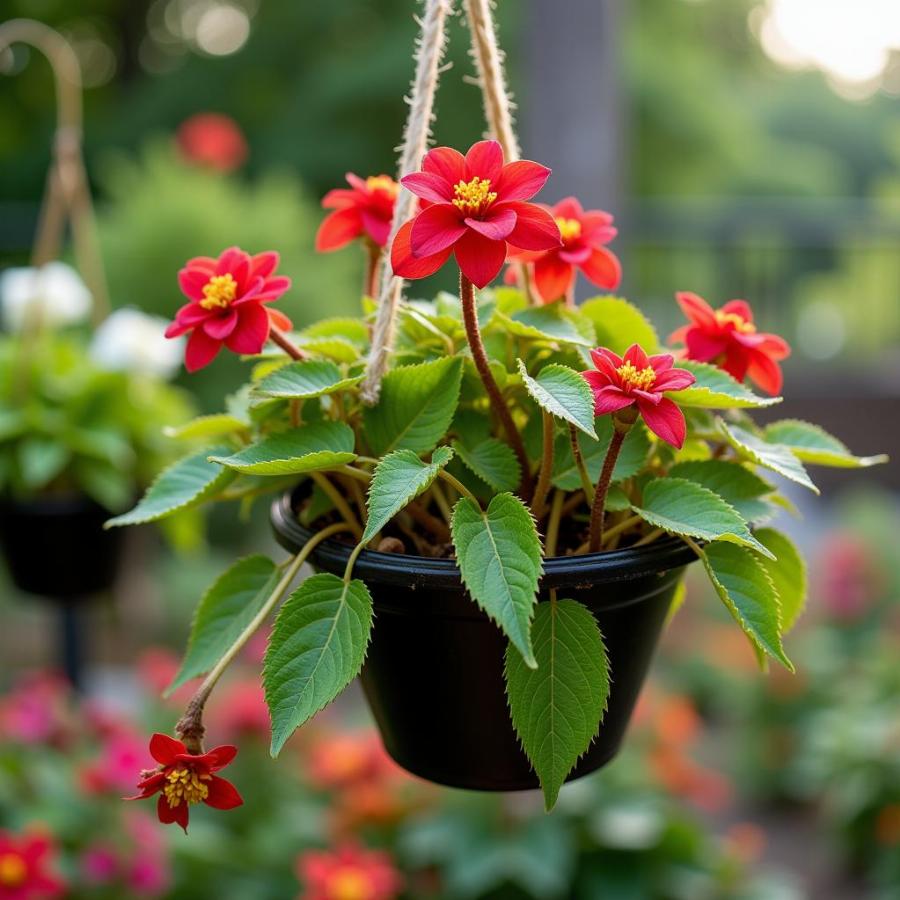Begonias are popular garden plants known for their vibrant colors and beautiful foliage. But are begonias poisonous to dogs? The answer is yes, although the level of toxicity is generally considered mild to moderate. Knowing the potential risks and taking appropriate precautions is essential for keeping our canine companions safe.
Understanding Begonia Toxicity in Dogs
The primary toxic agent in begonias is soluble calcium oxalates. These microscopic crystals are found in all parts of the plant, including the stems, leaves, and flowers, but are most concentrated in the tuberous roots. When a dog chews on or ingests any part of a begonia, these crystals are released, causing irritation and inflammation in the mouth, throat, and gastrointestinal tract.
Symptoms of Begonia Poisoning in Dogs
The severity of symptoms can vary depending on the amount of begonia ingested and the size of the dog. Common signs of begonia poisoning include:
- Oral Irritation: Drooling, pawing at the mouth, and difficulty swallowing.
- Vomiting: This can be a common reaction to the irritation caused by the calcium oxalates.
- Diarrhea: May also occur as the body attempts to expel the irritant.
- Loss of Appetite: Your dog may be less interested in food due to discomfort.
In more severe cases, although rare, swelling of the throat and difficulty breathing can occur. If you notice your dog exhibiting any of these symptoms, especially after potential contact with begonias, it’s crucial to seek immediate veterinary attention. Dogs foaming at the mouth can be a sign of various issues, including plant poisoning.
What to Do if Your Dog Eats a Begonia
If you suspect your dog has ingested a begonia, here’s what you should do:
- Remove the Plant: Immediately remove any remaining begonia material from your dog’s reach.
- Rinse the Mouth: If possible, gently rinse your dog’s mouth with water to help remove any remaining plant material and alleviate irritation.
- Contact Your Veterinarian: Even if your dog seems fine, it’s always best to contact your veterinarian or a pet poison control center for advice. They can assess the situation and recommend the appropriate course of action based on your dog’s breed, size, and the amount of begonia ingested.
Preventing Begonia Poisoning
The best way to prevent begonia poisoning is to keep these plants out of your dog’s reach. Consider placing them in hanging baskets, on high shelves, or in a fenced-off area of your garden. If your dog is particularly persistent about exploring the garden, you might want to choose non toxic flowers for dogs instead of begonias.
 Begonia plant in a hanging basket, safe from dogs
Begonia plant in a hanging basket, safe from dogs
Are All Begonias Equally Toxic?
All types of begonias contain calcium oxalates and are therefore considered potentially toxic to dogs. However, the concentration of these crystals can vary between species. Tuberous begonias tend to have a higher concentration in their roots, making them potentially more dangerous if dug up and ingested.
Other Plants to Be Aware Of
Begonias are not the only garden plants that can be harmful to dogs. Are azaleas toxic to dogs? Yes, they are highly toxic and should be avoided entirely. It’s important to be aware of the potential hazards in your garden and take necessary precautions.
Expert Insights
Dr. Emily Carter, a veterinary toxicologist, states: “While begonias are generally considered mildly toxic, the reaction can vary significantly between dogs. It’s always best to err on the side of caution and contact a veterinarian if you suspect ingestion.”
Additionally, veterinary technician Sarah Miller adds: “Prevention is key. Educating yourself about potentially harmful plants and taking proactive steps to keep them away from your pets can prevent many unnecessary emergencies.”
Conclusion
While the toxicity of begonias is usually mild, it’s crucial to be vigilant and take preventive measures to protect our furry friends. By understanding the risks and following the advice outlined in this article, you can ensure that your dog remains safe and healthy while still enjoying a beautiful garden. Remember, if you suspect your dog has ingested a begonia, contact your veterinarian immediately. Are begonias poisonous to dogs? Yes, so prioritize your pet’s safety and well-being.
FAQ
- What part of the begonia is most toxic? All parts of the begonia plant contain calcium oxalates, but the concentration is highest in the tuberous roots.
- Can begonias kill dogs? While rare, severe reactions can occur. It’s essential to seek veterinary care promptly.
- What are the first signs of begonia poisoning? Drooling, pawing at the mouth, vomiting, and diarrhea.
- How can I prevent my dog from eating begonias? Keep begonias out of reach in hanging baskets or fenced areas.
- Are there any non-toxic alternatives to begonias? Yes, many beautiful and dog-friendly flowers exist. Consult with your local nursery for recommendations.
- Should I induce vomiting if my dog eats a begonia? No, do not induce vomiting without consulting a veterinarian first.
- How long do begonia poisoning symptoms last? The duration of symptoms varies but typically resolves within 24 hours with appropriate care.
More Helpful Resources on Beaut Dogs
- Dogs that drool
- Dog-friendly gardening tips
Beaut Dogs is your trusted resource for all things related to dog care, offering expert advice and helpful tips to ensure your canine companion lives a long, healthy, and happy life. For further assistance and detailed answers to your specific dog care questions, please contact us via Email at [email protected]. We’re always here to help! Beaut Dogs is dedicated to providing comprehensive information about canine care, from breed-specific needs to general health and well-being.